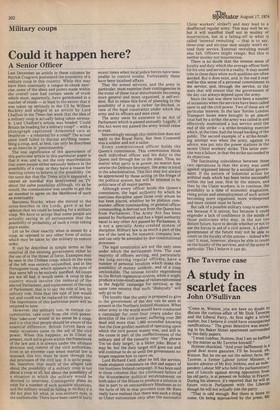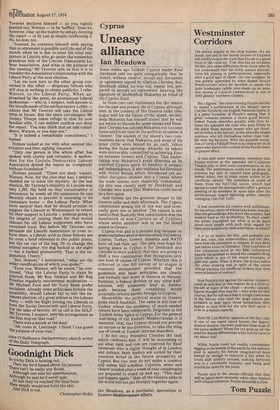The Taverne case
A study in scarlet faces
John O'Sullivan
"Come in, Watson, you are here no doubt to discuss the curious affair of Mr Dick Taverne and the Liberal Party, At first sight a trivial matter, but I believe it could have unsuspected ramifications." The great detective was standing in his Baker Street apartment surrounded by the daily papers.
"I must confess, Holmes, that I am as baffled by the matter as Mr Taverne himself."
Holmes chuckled. "And your bafflement is a good deal more genuine, I'll be bound, eh, Watson. But let me set out the salient facts. Mr Taverne, a former Labour junior Minister, a known admirer of Mr Roy Jenkins, and an independent Labour MP who held the parliamentary seat of Lincoln against strong opposition from his old party, is at present on holiday in France. During his absence, it's reported that he will in future vote in Parliament with the Liberals though he will not actually join the party.
"That is odd enough. But there is more to come. On being approached by the press, Mr Taverne declares himself — as you rightly pointed out, Watson — to be 'baffled.' Does he, however, clear up the matter by simply denying the report — or by just as simply confirming it. No, he does not.
"Instead, he contents himself with saying that no statement is possible until the end of the month when he is due to meet his local supporters in Lincoln who go under the somewhat grandiose title of the Lincoln Democratic Labour Association. And what is the purpose of this meeting? Mr Taverne tells us that it is to consider the Association's relationship with the Liberal Party at the next election.
"Let me now turn to the other group concerned in this affair — desperate fellows who will stop at nothing to obtain publicity. I refer, Watson, to the Liberal Party. When approached by the press, an anonymous Liberal spokesman — who is, I suspect, well-known to the bloodhounds of the parliamentary Lobby — admits that Mr Taverne will take the Liberal whip in future. But the more circumspect Mr Jeremy Thorpe takes refuge in that by now familiar alibi, 'I can neither confirm nor deny the report.' You may think that an odd coincidence, Watson, or you may not."
"It is indeed a remarkable coincidence," I replied.
Holmes looked at me with what seemed like irritation and then, sighing, resumed: "Only one person in this whole affair has Spoken with clarity and certainty. A spokesman for the Lincoln Democratic Labour Association denied the report as 'completely Without foundation'."
Holmes paused: "These are deep waters, Watson. Now, for the clue that has, I nelieve, enabled me to solve the mystery. At the last election, Mr Taverne's majority in Lincoln was only 1,293. His hold on that constituency is Precarious; he needs all the assistance he can decently obtain to prevent it returning to its customary home — the Labour Party. What more natural than that he should promise to support the Liberals at Westminster in return for their support in Lincoln — without going to the lengths of joining them for that would alienate his old Labour supporters who have remained loyal. But before Mr Taverne can Persuade the Lincoln Association or even inform them, a Liberal, avid as these fellows are for even a brief reference in the public prints, lets the cat out of the bag. Or to change the animal metaphor, the dog barked in the night — but it barked prematurely. That is the explanation, I fancy." "But, Holmes," I interjected, "what are the Wider ramifications of which you spoke?"
"Even you, Watson, will be aware," he continued, "that the Labour Party is riven by internal feuds. Mr Roy Jenkins and Mr Reg Prentice regularly recommend moderation — Mr Michael Foot and Mr Tony Berm prefer socialism. Already some politicians foresee the Possibility, should Labour fail to win the imminent election, of a great schism in the Labour Party — with the Right joining the Liberals to form the Social Democratic and Liberal Party. For the sake of brevity, let us call it the SDLP. Mr Taverne, I suspect, sees his arrangement as the first step on that road." There was a knock at the door.
"Ah, come in, Lestrange, I think I can guess the Purpose of your visit."
John O'',Sullivan is Parliamentary sketch writer Of the Daily Telegraph. allft11.1.1■



































 Previous page
Previous page